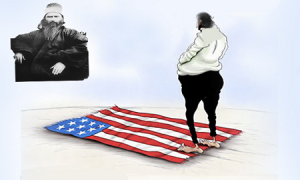The self-proclaimed prophet of Baha’ism forged worships for his followers in order not to straggle other religions in this regard. Two question will be arisen in this regard: who is the aim of this worship? How much do the Baha’is bond with this worship in Baha’ism?
- The aim of worship: In the divine religions, the place of Kiblah or its structure (such as stone, cloth) is not important, but the main aim is God. However; contrary to this monotheistic belief, the Baha’is are considering the false claimants such as Hussein Ali Nouri, the self-proclaimed prophet of Baha’ism, as their movable Kiblah[1] and their assume the aim of their caresses and worships as having relationships with the self-proclaimed prophet of Baha’ism not God.[2]
- The extent of bonding with worshipping: The forged prophet of Baha’ism has announced the number of units of prayer of his creed as nine[3]. Encouraging his followers to perform this prayer, he has emphasized that he has explained its method of performing in another sheet.[4] The most interesting note is that the Baha’is are claiming for some parts of his works and writings were destroyed during the differences among the offspring of the self-proclaimed prophet of Baha’ism (Abbas and Muhammad Ali) over the father’s succession and power. Those works and writings were in the hands of Muhammad Ali exclusively. One of these works was the nine-unit prayer of the Baha’is which was destroyed by Muhammad Ali. So, none of the Baha’is are aware of it.
However, Abdul Baha has just expressed regression for missing it and it is surprising why hasn’t he been aware of this prayer while the Baha’is consider him as inspired with the divine inspirations[5]. Hasn’t this prayer performed even once by him while his father informed about it 19 years before!!!
[۱] Ishraq Khawari, the writings about the book “Aqdas”, Germany: the national assembly of publishing the faith works, 1997 A.D., Editted by Vahid Ra’fati, pp. 33-34.
[۲] The faith news magazine, the Iranian Baha’is national assembly periodical, No. 6, year: 1328 A.D., p. 8.
[۳] Hussein Ali Nouri, the Aqdas, Heyfa, the occupied Palestine, the Baha’i universal center, 1995 A.D., p. 6, paragraph 6.
[۴] Ibid, p. 9, paragraph 8.
[۵] Refer to Ishraq Khawari, the treasury of limitations and commandments, Bija, 128 Badi’a, p. 32.






